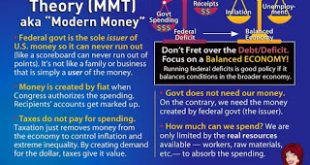Excellent post featuring – drumroll – Marx.Note that "parasites" means free riders.Bill Mitchell – billy blogTracing the roots of progressive views on the duty to work – Part 1Bill Mitchell | Professor in Economics and Director of the Centre of Full Employment and Equity (CofFEE), at University of Newcastle, NSW, Australia
Read More »Stephen Grenville – Modern Monetary Theory and mainstream economics converging
When MMT started to gain acceptance in some parts of the mainstream, the neoclassical economists fiercely fought back, but now it looks like they are finally losing the debate. More and more people are now prepared to give it a try because they think it looks feasible. 7. Conclusion MMT proponents must feel that their moment has arrived at last. The core elements of their proposal are being more widely accepted by mainstream economists and now, with COVID, being put into...
Read More »Covid-19 infections leave an impact on the heart, raising concerns about lasting damage
One study examined the cardiac MRIs of 100 people who had recovered from Covid-19 and compared them to heart images from 100 people who were similar but not infected with the virus. Their average age was 49 and two-thirds of the patients had recovered at home. More than two months later, infected patients were more likely to have troubling cardiac signs than people in the control group: 78 patients showed structural changes to their hearts, 76 had evidence of a biomarker signaling cardiac...
Read More »DrcMonica Gandhi – Mask wearing may decrease severity of COVID-19
It's bizarre how the people who complained the most about the Lockdowns harming our economy are the very same people who are the most resistant to wearing masks, which could reduce further lockdowns. Mask wearing could mean we never need a lockdown again, according to Dr Monica Gandhi.Covid-19 is different to the flu virus in that most people who get it will have mild symptoms or be asymptomatic. But in those people that are badly affected their immune system overreacts going into a cytokine...
Read More »ATOMIC BOMBINGS AT 75: Another Hiroshima is Coming — Unless We Stop It Now — John Pilger
Dire warning.CounterpunchATOMIC BOMBINGS AT 75: John Pilger — Another Hiroshima is Coming — Unless We Stop It NowJohn PilgerMay not make a difference though.Collapse inevitable within a few decades anyway.Nature Scientific ReportsDeforestation and world population sustainability: a quantitative analysis Mauro Bologna and Gerardo Aquino
Read More »Why Microsoft wants TikTok — Tom Warren
Mixer streaming service. Microsoft has been favoring its enterprise software and services, and even Cortana has transitioned to be productivity-focused. How does a service that caters to dancing teenagers fit with Microsoft’s buttoned-up business demographic?If you dig a little deeper into Microsoft’s future ambitions, though, a move to acquire TikTok’s operations in the US, Canada, Australia, and New Zealand could benefit many of Microsoft’s existing businesses while also setting the...
Read More »Will the SECOND WAVE of CORONAVIRUS be WORSE than the first? – VisualPolitik EN
Masks reduce the spread of COVID-19 infections, as well as lowering the viral load, leading to a far less severe infection. In this way, masks will also significantly reduce the impact that Covid-19 will have on our economies.The conspiracists always complained that the Lockdowns were doing far too much damage to our economies, and yet they refuse to wear masks which could limit the impact of COVID-19. Pay close attention to this data: 13.5 million cases and about 600,000 deaths worldwide....
Read More »Is the fiscal cliff on hold? It may not even happen.
New data suggests there may not be a fiscal cliff after all. That doesn't workers and parts of the economy won't suffer, but stocks could still rise. More data is needed. Trade and invest using the concepts of MMT. Get a 30-day free trial to MMT Trader. https://www.pitbulleconomics.com/mmt-trader/?s2-ssl=yes/ Download my podcasts! New one every week. https://www.buzzsprout.com/1105286
Read More »Why Can’t We All Just Get Along? The Uncertain Biological Basis of Morality — Robert Wright
If you put Greene’s findings in general form—human “reasoning” is sometimes more about gut feeling than about logic—they are part of a wave of behavioral-science research that in recent years has raised doubts about how much trust your brain deserves. The best-seller lists have featured such books as Predictably Irrational, by the Duke psychologist Dan Ariely, and Thinking, Fast and Slow, in which the Princeton psychologist and Nobel laureate Daniel Kahneman covers acres of research into...
Read More »Updated – How Your Brain Is Getting Hacked: Facebook, Tinder, Slot Machines | Tristan Harris
Updated with KV Tweet I read an article recently which warned that too much use of social media can chronically raise cortisol levels which can lead to long term ill health.I sometimes spend days debating with conspiracists, deniers, and very recently with some Zionists, which was particularly ugly because they believe they are fighting a war.These debates often leave me feeling wired and irritated. Sometimes I realise that the person I have been fiercely debating with is actually quite a...
Read More » Mike Norman Economics
Mike Norman Economics



